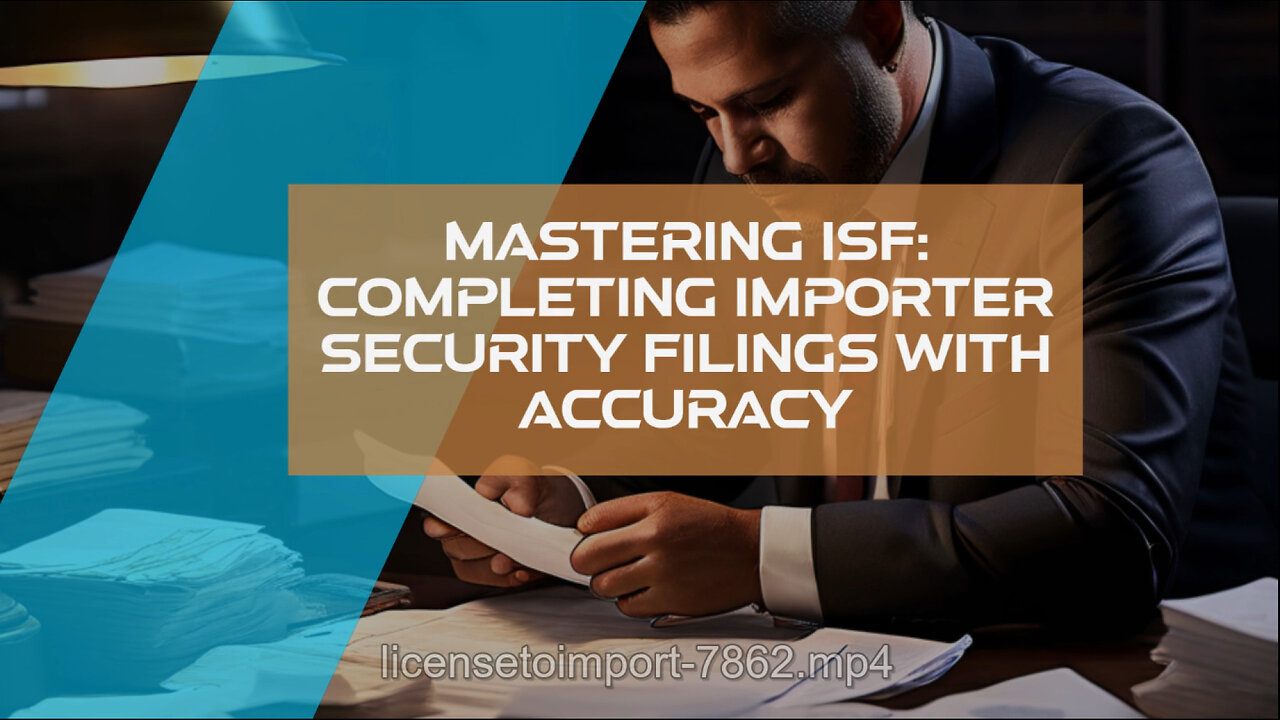Premium Only Content

Mastering Importer Security Filing : Tips, Common Mistakes, and Technology
License To Import // 323-578-6432 // file@licensetoimport.com // www.licensetoimport.com
This response provides a comprehensive overview of completing an Importer Security Filing (ISF) accurately in the context of customs brokerage. The importance of understanding ISF and its components, such as manufacturer/supplier information, shipper/exporter information, importer of record information, and consignee information, is emphasized. Filing timeframes and accuracy are discussed, highlighting the significance of meeting the 24-hour filing requirement and avoiding errors or incomplete information. The role of customs brokers in assisting with accurate ISF completion is mentioned, along with common mistakes to avoid, such as incorrect Harmonized System (HS) codes, incomplete or missing information, and late filings. The use of technology, particularly specialized software or platforms, for efficient ISF filing is also highlighted. The conclusion encourages viewers to subscribe for more informative content on customs brokerage and international trade.
#usimportbond #isfcustomsbroker #uscustomsclearing #isfentry
Video Disclaimer Here: This video is solely for education and is not endorsed by any US government agency.
00:44 - Importer Security Filing (ISF) is a requirement by US Customs and Border Protection (CBP) to enhance the security of shipments entering the United States by providing advance information about imported cargo.
01:36 - Key components of an ISF include manufacturer/supplier information, shipper/exporter information, importer of record (IOR) information, and consignee information.
02:57 - Filing an ISF accurately is crucial, with a requirement to file at least 24 hours before the goods are loaded onto a vessel destined for the US to avoid delays, fines, and cargo holds.
03:32 - Working with a customs broker, avoiding common mistakes like incorrect HS codes, incomplete information, and late filings, and leveraging technology can help streamline the ISF filing process and ensure compliance with CBP requirements.
-
 34:38
34:38
Tudor Dixon
2 hours agoThe Changing Landscape Between Tech and Politics with Mike Benz | The Tudor Dixon Podcast
3.85K -
 2:23:58
2:23:58
Matt Kohrs
12 hours agoRumble's Stock Is EXPLODING!!! || The MK Show
60.9K5 -
 LIVE
LIVE
LFA TV
15 hours agoBOMBSHELL FINAL REPORT: BIDEN ADMIN SUPPRESSED WUHAN LAB LEAK | LIVE FROM AMERICA 12.27.24 11am EST
1,855 watching -
 43:07
43:07
Grant Stinchfield
1 hour ago $1.07 earnedWe Built it... China Controls it... Trump Will Take it Back!
7.16K2 -
 35:05
35:05
Rethinking the Dollar
1 hour agoTime to Pay the Piper! Debt Refinance Coming in 2025
11.8K1 -
 52:34
52:34
PMG
15 hours ago $2.87 earnedHannah Faulkner and Steve Friend | EXPOSE THE FBI CORRUPTION - KASH PATEL
12.1K2 -
 2:58:58
2:58:58
Wendy Bell Radio
7 hours agoOn Day One
80.4K71 -
 1:59:27
1:59:27
Jeff Ahern
4 hours ago $3.55 earnedFriday Freak out with Jeff Ahern (6am Pacific)
27K1 -
 1:56:07
1:56:07
Game On!
12 hours ago $1.28 earnedJosh Allen is the NFL MVP! It's not even close!
16.4K2 -
 13:05
13:05
Neil McCoy-Ward
3 hours agoWhy The Media Won't Tell You What Milei Did In Argentina...
22.8K1